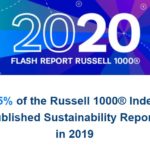Contrary to the belief that multinationals suffer from environmental regulation, large companies that adopt strict global environmental standards in developing countries are rewarded with higher stock market performance, according to a study published in a journal of the Institute for Operations Research and the Management Sciences (INFORMS®).
We have found a significant and positive relationship between the market value of a company and the level of environmental standard it uses," say the authors.
Of the companies examined in the study, firms choosing to employ their own strict global environmental standard abroad are found to have an individual value of approximately $10.4 billion higher than those using less stringent U.S. standards, after controlling for the influence of physical assets, capital structure, and multinationality.
The authors write, "This paper refutes the idea that adoption of global environmental standards by multinational enterprises constitutes a liability that depresses market value. On the contrary, the evidence from our analysis indicates that positive market valuation is associated with the adoption of a single stringent environmental standard around the world."
The study also warns developing countries that using lax environmental regulations to attract foreign direct investment may bring them poorer quality, less competitive firms.
The study "Do Corporate Global Environmental Standards Create or Destroy Market Value?" is by Glen Dowell, University of Notre Dame; Stuart Hart, Kenan-Flagler Business School, University of North Carolina at Chapel Hill; and Bernard Yeung, NYU Stern School of Business. It appears in the current issue of Management Science, an INFORMS publication.
Tying Environment to Market Value
The researchers investigated two questions:
1. Are multinational enterprises more profitable when they surpass lax environmental standards in developing countries? Phrased differently: Is adhering to stricter environmental standards associated with higher market value or does it represent nonproductive use of assets?
2. Do improvements in environmental standards actually lead to increased market value?
Addressing the second question, the researchers were unable to determine if environmental measures undertaken in one year result in higher market value in a subsequent year.
Large Firms Polluting Less
The researchers examined a sample of 89 manufacturing and mining companies headquartered in the United States that are included in the Standard and Poors 500 Index. Only multinational enterprises that had production operations in countries with GDP per capita below $8,000 were sampled.
The researchers measured a companys market value using a measure called Tobins q, an indicator of intangible value often used by economists. Tobins q is defined as firm market value per dollar of replacement costs of tangible assets. The sample period was 1994-1997.
Companies compliance with environmental standards was derived from the Investor Responsibility Research Centers Corporate Environmental Profile for the years 1994-1997. The profile indicates if a multination firm adheres only to local standards, applies American standards abroad, or uses a stringent internal environmental standard that exceeds any national standard.
Surprisingly, the researchers found that defaulting to lax local environmental standards is by no means the most common practice. Nearly 60% of the companies observed in this sample adhere to a stringent internal standard, compared to less than 30% that only enforce developing countries standards.
The authors suggest several possible interpretations for their findings.
* Public relations: Interest groups and non-governmental organization expose unsound corporate environmental practices, raise consumer awareness, and put pressure on governments to discipline polluters even if the pollution is in overseas locations. To avoid censure, many managers maintain a high level of environmental practice in all company locations.
* Bottom line benefits: Choosing stringent environmental standards is more profitable than defaulting to lower or poorly enforced local environmental standards.
The authors concede that the increased productivity observed in the study may be a result of using new technologies and equipment. Nevertheless, they suggest, firms that adopt high environmental standards are those that strive for eco-efficient production systems. The conscious policy to pursue technologies and processes that increase resource productivity of their operations has a positive result for the bottom line.
* Low performers race to the bottom: Economists sometimes interpret Tobins q as a measure of firm "quality." In this instance, quality firms generate less pollution and strive to be the best in all their operations while lower-quality firms engage in what is described as a "race to the bottom" to gain short-term financial advantage.



